Publications
This page collects together publications on issues related to women in politics from both the Pacific and the world. It collects together research documents, campaigning resources and key papers. If you have a publication we have missed, please send it to the PacWIP team at pacwip@gmail.com.
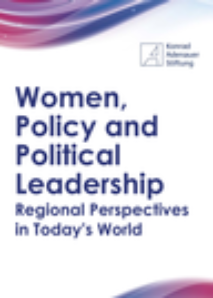
Report: Women Policy & Political Leadership: Regional perspectives
The Konrad-Adenauer-Stiftung (KAS) is a political foundation. The report aims to share perspectives on women in political leadership from the regions of Africa, America, Asia, Australiasia including a piece on Pacific trends, and Europe.
Women’s political leadership and the equal participation of women in public affairs and decision-making are key elements of democracy and prerequisites for achieving sustainable development. In the last few
decades, there has been remarkable progress in this regard with more opportunities for women in leadership roles and significant steps being taken towards achieving gender equality. The world average of women in
parliament has increased from 15.7% in 2004 to 22.1% in 2015 to 25.11 % in 2020. Nonetheless, we have still not reached the target of 30% of women in decision-making positions set by the Beijing Platform for Action in 1995.
Author: Edited by Christian Echle and Megha Sarmah
Institution: Konrad Adenauer Stiftung
Date: May 20, 2021
File size and type: 4.00 MB
Download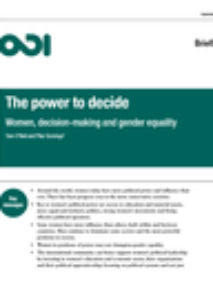
ODI report (2015): The Power to Decide: Women, decision-making and gender equality
The Overseas Development Institute (ODI) is the UK's leading independent think tank on international development and humanitarian issues. This ODI report focuses on women’s decision-making power, in particular their ability to influence political decisions about the distribution of public authority, rights and resources. It looks at the reasons for women’s increased presence in public life around the world, and why women in some socioeconomic groups, sectors and countries have less political power than others. It also examines when and how women have power and influence in practice, and what they seek to achieve. Recommendations on how the international community can better support women’s access to decision-making and leadership are presented as well.
Author: The Power to Decide: Women, decision-making and gender equality
Institution: Overseas Development Institute (ODI).
Date: May 20, 2021
File size and type: 79.94 KB
Download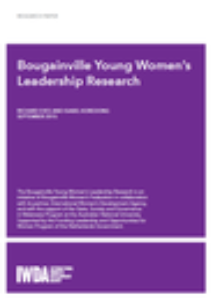
Bougainville Young Women’s Leadership Research
Author: Richard Eves and Isabel Koredong
Institution: International Women's Development Agency
Date: January 9, 2015
File size and type: 2.01 MB
Download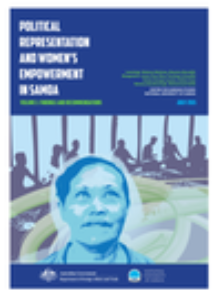
Political Representation and Women’s Empowerment in Samoa
This report provides the findings, analysis and policy significance of research aimed to better understand the barriers to women’s political participation in Samoa. The paradoxical situation is that Samoan women have achieved approximate equality to men in most modern spheres of government and the economy, yet have never, since Samoa’s independence in 1962, succeeded in winning more that five seats in the 49 seat parliament. In most parliaments, women have held only one or two seats, usually for a single term. In 2015 Samoa was among the countries ranked lowest int he world for women’s representation in parliament, at 128 out of 140 countries. The research was conducted with assistance from, and in collaboration with, the Ministry of Education, Sports and Culture (MESC) and the Ministry of Women, Community and Social Development (MWCSD) over the period April 2013 to July 2015. It consisted of (i) a nationwide survey of women’s participation in political and economic village-based organizations, covering all villages and sub-villages in Samoa; (ii) a qualitative study of village organisation in a sample of 30 villages with and without formal obstacles to women’s participation in village government, and (iii) interviews of women candidates who have stood for past elections.
Author: Report - Volume 1
Institution: Centre for Samoan Studies, National University of Samoa
Date: January 7, 2015
File size and type: 1.31 MB
DownloadAuthor: Report - Volume 2
Institution: Centre for Samoan Studies, National University of Samoa
Date: January 7, 2015
File size and type: 3.76 MB
Download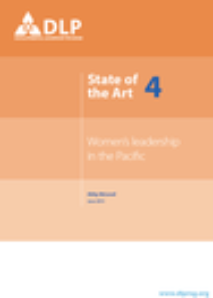
Women’s Leadership in the Pacific
This paper summarises the state of knowledge on women’s leadership in the Pacific. It concentrates on three spheres: 1) formal politics, the main focus of the literature on women’s empowerment; 2) the bureaucracy, an important employer of women; and 3) civil society, where Pacific women are particularly active. It highlights that Pacific women’s prominent informal peacebuilding role has not always led to their participation in formal peacebuilding processes: opportunities to facilitate equitable social and political change have been missed. In relation to the limited evidence base, it notes that women’s impact on governance and policy-making in the region has received little scrutiny. Further, although gender analyses carried out as part of donor-funded capacity development programmes contain much information on women’s participation in Pacific bureaucracies, this material is rarely made public.
Author: Dr Abby McLeod
Institution: Developmental Leadership Project (DLP)
Date: N/A
File size and type: 570.10 KB
Download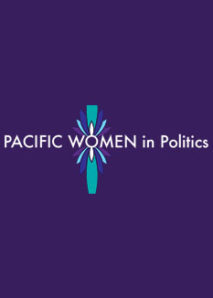
Women’s Under-Representation and Special Measures in the Tongan Parliament
Tonga's parliament has never seen more than two women representatives in a single parliamentary term, and there is no sign of a gradual improvement in women's representation over time. Special measures — that is, legislative reforms to increase women's political representation — can be controversial developments, but in this context the institution of special measures would be a means to guarantee the presence and the contribution of women in parliamentary politics. Women activists in Tonga have mostly advocated either a reserved seat model or a 'safety net' model of special measures. This In Brief sets out the cases for and against these two models, with examples from the Pacific islands region, and conclude with a brief discussion of the Tongan political context.
Author: Kerryn Baker
Institution: ANU Department of Pacific Affairs
Date: N/A
File size and type: 214.58 KB
Download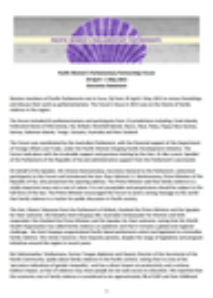
Outcomes Statement: Pacific Women’s Parliamentary Partnerships Forum 2015
This is the Outcomes Statement from the Second Annual Meeting of Pacific Women Parliamentarians. Women members of Pacific Parliaments met in Suva, Fiji from 29 April to 1 May 2015 to renew friendships and discuss their work as parliamentarians. The Forum’s focus in 2015 was on the theme of family violence in the region. The forum included 63 parliamentarians and participants from 15 jurisdictions including: Cook Islands, Federated States of Micronesia, Fiji, Kiribati, Marshall Islands, Nauru, Niue, Palau, Papua New Guinea, Samoa, Solomon Islands, Tonga, Vanuatu, Australia and New Zealand.
Author: Participants Outcomes Statement
Institution: Pacific Women's Parliamentary Partnerships Programme
Date: May 20, 2021
File size and type: 281.21 KB
Download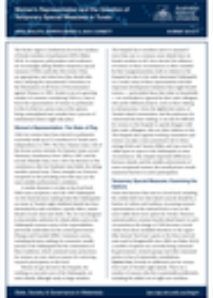
Women’s Representation and the Question of Temporary Special Measures in Tuvalu
This paper was produced as part of the SSGM, ANU Briefing Paper Series on women's leadership issues in the Pacific.
Author: Asita Molotii, Kerryn Baker & Jack Corbett
Institution: State Society & Goverrnance in Melanesia Project, ANU
Date: March 3, 2015
File size and type: 237.27 KB
Download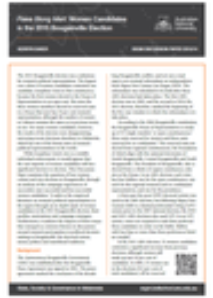
Pawa Blong Meri: Women Candidates in the 2015 Bougainville Election
This Discussion Paper examines the question of how women contest and win elections in Bougainville, through an analysis of the campaign experiences of successful, near-successful and less successful women candidates. It adds to the empirical literature on women’s political representation in the region through an in-depth study of women candidates in the 2015 Bougainville election: their profiles, motivations and campaign strategies. Furthermore, it analyses the impacts of three issues that emerged as common themes in discussions around women’s participation in political decision making in Bougainville: the electoral system, money politics and matrilineal traditions.
Author: Dr Kerryn Baker
Institution: State Society & Governance in Melanesia Project, ANU
Date: February 3, 2015
File size and type: 301.42 KB
Download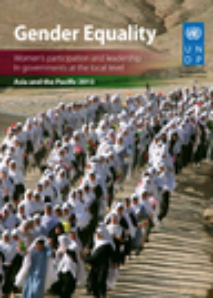
Gender Equality: Women’s participation and leadership in governments at the local level
This report by UNDP provides research and analysis of the underlying causes for the lack of participation by women in leadership at local and national levels to help policymakers and all stakeholders who are trying to improve participation and leadership by women leading to also security and safety of women in the region. Following from the Women’s Representation in Local Government in Asia-Pacific: Status Report 2010 and the regional conference on South Asia Women’s Political Leadership in Dhaka held in 2011, and the common declaration on Women’s Political Leadership in South Asia, the report analyses where progress has been made, and more importantly, where and why progress has fallen short, concluding with recommendations for how changes may be made within the emerging trends in the region. The report also has collected an impressive amount of statistics on women’s political representation at the national, district and local levels, as well as showing the different trends in South Asia, Southeast Asia, and the Pacific Islands, which can facilitate targeted interventions by the various stakeholders engaged in gender empowerment.
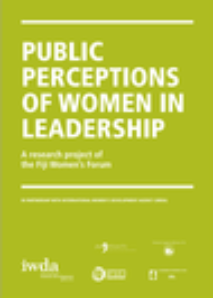
Public Perceptions of Women in Leadership – a Research Project of the Fiji Women’s Forum
This 2014 study looks at the perception of women in politics and leadership generally in Fiji. The study draws attention to the gender bias that lies at the heart of why women are under-represented in government and the necessity for definitive action to support women's political participation. A copy of the report can be obtained either from Fiji Women's Rights Movement, FemLINKpacific, the National Council of Women or the Soqosoqo Vakamarama iTaukei.
A two page brief from the International Women's Development Agency (IWDA) summarizes the findings and recommendations from the report. The research was done in partnership with IWDA.
Author: Fiji Women's Forum/International Women's Development Agency
Institution: N/A
Date: May 20, 2021
File size and type: 541.60 KB
Download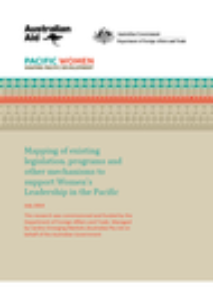
Mapping of existing legislation, programs and other mechanisms to support Women’s Leadership in the Pacific
This paper was commission by the Pacific Women Shaping Pacific Development Programme of the Australian Department for Foreign Affairs and Trade. The paper provides examples of existing programs, strategies, legislation and other mechanisms that aim to improve women’s leadership and decision-making in politics, government and business in the Pacific. In addition, the paper looks at leadership in relation to improving the safety of women and children; and enhancing leadership of young women. Reviews of programs are included where available.
Author: Dr Helen Tavola
Institution: Pacific Women/DFAT
Date: January 7, 2014
File size and type: 1.01 MB
Download
